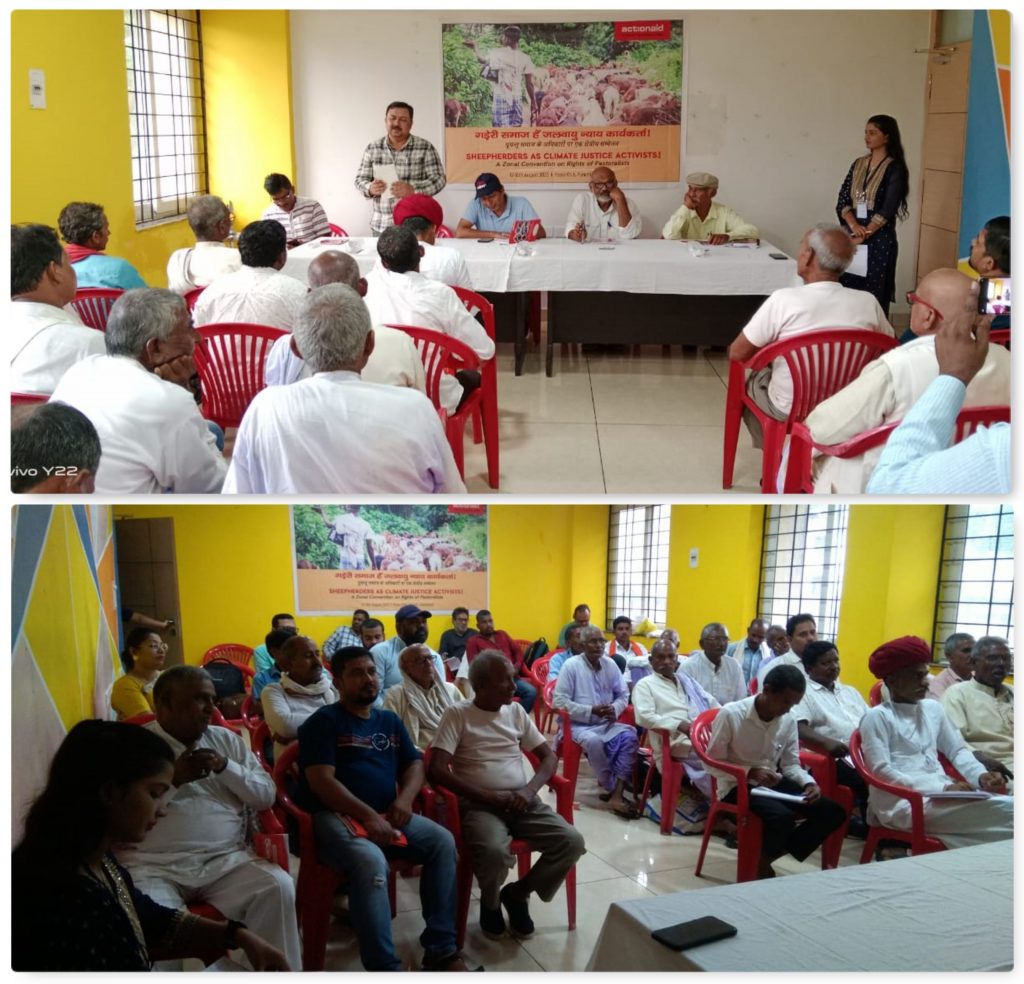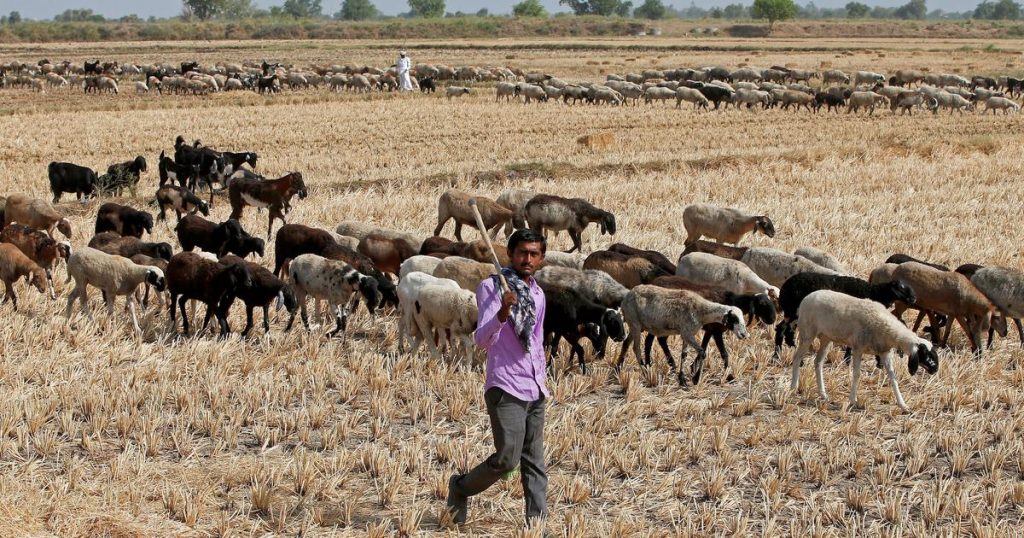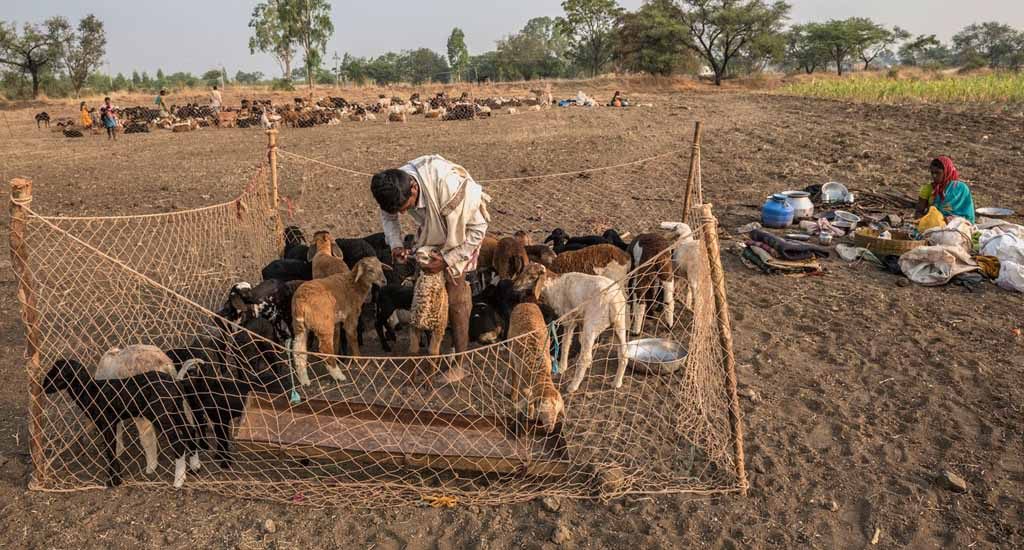 Ranchi: A two-day zonal convention on “Rights of Pastoral Community” under the theme “Sheepherders as Climate Justice Activists!” concluded at the Press Club in Ranchi today. SAMVAD, a grassroots civil society organisation and ActionAid Association organised the meeting to highlight the unique challenges pastoral communities face in Eastern India.
Ranchi: A two-day zonal convention on “Rights of Pastoral Community” under the theme “Sheepherders as Climate Justice Activists!” concluded at the Press Club in Ranchi today. SAMVAD, a grassroots civil society organisation and ActionAid Association organised the meeting to highlight the unique challenges pastoral communities face in Eastern India.
Esteemed speakers, including members of pastoral communities, government officials and subject experts, convened to discuss and debate the invaluable experiences and multifaceted challenges pastoralists face. These discussions aimed to chart a path towards solutions tailored to the unique needs of these communities.
Shankar Bhagat, a pastoralist from Raniganj, West Bengal, highlighted his challenges in sheep rearing and the generational shift in preferences, as the youth are less inclined to engage in pastoralism. Abhimanyu Bhagat from the same region emphasised the shortage and inadequacy of government incentives and how economic hardship forced some pastoralists to abandon their traditional work. Sabar M Debasi, a pastoralist from Rajasthan, also shared his challenging first-hand experiences as a sheepherder.
Sandeep Chachra, Executive Director of ActionAid Association, shared alarming statistics concerning grazing lands. “Over the last 15 years, grazing lands have been diminished by 31 per cent,” he disclosed. Climate change is a driving force behind these changes, creating disparities for livestock and affecting market conditions. Sandeep highlighted the challenging reality pastoral communities face as climate justice advocates and the need for collaborative efforts to address this. He reiterated the aspiration to extend the reach of this initiative to the village level across states, as well as the need to involve youth in the process.
Ghanshyam, Director of SAMVAD, Jharkhand, brought attention to the community-oriented features of pastoralism. He asserted that “pasture is not a caste; it is a community with collective feelings and living patterns. These communities operated based on scientific principles that deserve understanding, recognition and documentation.” Ghanshyam’s words remind us of the rich cultural fabric that pastoralists contribute to society.
Sudhir Pal, an activist specialising in animal husbandry, took the stage to emphasise the significant challenge of pastoralists’ invisibility within policy-making circles. His words drew attention to the unfortunate consequences of this neglect: the lack of policy interventions that could uplift and support pastoral communities. His statement resonated as a stark reminder that pastoralists often find themselves overlooked in policy discussion and formulation. Sudhir’s assertion serves as a call to action for policymakers, urging them to acknowledge the vital role of pastoralists and the urgent need for targeted interventions to empower and uplift these communities.
C. Thakur, Research Scholar, shared key findings from her study on pastoral communities, poised to shape the discourse around the communities’ challenges and rights. Her dedication to capturing the essence of pastoralism contributes significantly to fostering awareness and informed dialogue on these vital topics.
Debabrat Patra, Zonal Director, East Zone, ActionAid Association, underscored the significance of pastoral communities’ contributions to the ecosystem. He shed light on how pastoral communities enhance soil productivity through their livestock’s manure, emphasising pastoralists’ vital role in maintaining the genetic diversity of approximately 50 million livestock under their care. Debabrat remarked that by safeguarding pastoral communities and recognising their essential contributions, we are equipping ourselves to combat climate change more effectively.
Saurabh Kumar, Regional Manager of ActionAid Association, leading work in Bihar, Jharkhand and Chhattisgarh, emphasised the pressing need to balance environmental conservation efforts with the space required for pastoralists’ livelihoods. In his poignant words, “We can make an elephant corridor – a passage marked by the government to allow the passage of elephants, but we must also ensure adequate space for livestock and the people caring for them.”
 India is home to a thriving community of pastoralists whose lifestyles represent one of the oldest and most sustainable systems. These herders practice mobility, moving their livestock from one climatic region to another every year in search of adequate food, suitable pastures and grasslands. Livestock rearing yields essential resources such as milk, meat, leather and wool, with the latter often being exported. Remarkably, women pastoralists play a pivotal role in collecting sheep’s wool for producing warm clothing and blankets. Additionally, pastoralists contribute significantly to conserving biodiversity and maintaining domestic animal diversity.
India is home to a thriving community of pastoralists whose lifestyles represent one of the oldest and most sustainable systems. These herders practice mobility, moving their livestock from one climatic region to another every year in search of adequate food, suitable pastures and grasslands. Livestock rearing yields essential resources such as milk, meat, leather and wool, with the latter often being exported. Remarkably, women pastoralists play a pivotal role in collecting sheep’s wool for producing warm clothing and blankets. Additionally, pastoralists contribute significantly to conserving biodiversity and maintaining domestic animal diversity.
 In the eastern Indian States of Bihar, Jharkhand, Odisha, Chhattisgarh and West Bengal, more than 2.5 million people from diverse communities rely on sheep rearing to sustain their livelihoods. These nomadic pastoralists traverse with their animals, encountering challenges such as limited resources, shifting climatic conditions and restrictions on entering forest and grazing lands. Furthermore, pastoral communities are not uniform and experience a myriad of identifications in the State as they are not officially recognised as “pastoralists” by the government. In some States, they are recognised as Scheduled Castes, while in others, they are deemed as other Backward Classes. They are marginalised communities with difficulty accessing basic amenities such as drinking water, shelter, medicine, education and health services. As nomads, they face problems accessing social security and other entitlement services. Furthermore, pastoralists do not receive grazing rights under the Forest Rights Act, and government veterinary services often do not reach migratory communities.
In the eastern Indian States of Bihar, Jharkhand, Odisha, Chhattisgarh and West Bengal, more than 2.5 million people from diverse communities rely on sheep rearing to sustain their livelihoods. These nomadic pastoralists traverse with their animals, encountering challenges such as limited resources, shifting climatic conditions and restrictions on entering forest and grazing lands. Furthermore, pastoral communities are not uniform and experience a myriad of identifications in the State as they are not officially recognised as “pastoralists” by the government. In some States, they are recognised as Scheduled Castes, while in others, they are deemed as other Backward Classes. They are marginalised communities with difficulty accessing basic amenities such as drinking water, shelter, medicine, education and health services. As nomads, they face problems accessing social security and other entitlement services. Furthermore, pastoralists do not receive grazing rights under the Forest Rights Act, and government veterinary services often do not reach migratory communities.
It was in recognition of the diversity within pastoral communities and the pressing need to make them the true custodians of ecological justice that SAMVAD and ActionAid Association hosted the Zonal Level Convention.

